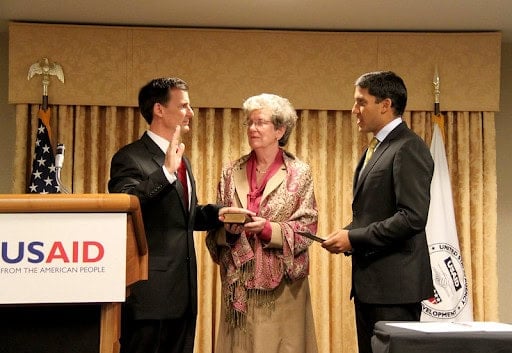
Retirement from the Foreign Service or USAID rarely meant slowing down. For many officers, it became a second chapter full of reinvention, mentoring, community building, and sometimes unexpected humor. We have put together a document that brings together the experiences of U.S. Foreign Service officers, from USAID and other foreign affairs agencies , after they retired from government service.
Some found themselves busier than ever. Norma Parker had multiple “retirements” after being recalled for missions in Kosovo, Afghanistan, Pakistan, and Nicaragua long after her official 1999 retirement. Similarly, Denise Rollins retired in 2014 only to be tapped almost immediately to lead the Africa Ebola Response Unit. Nancy Tumavick spent more than twenty years as an independent consultant after retiring in 1995, seemingly busier than when she was on staff. Stephen Wingert saw even more of the world – having completed 125 assignments in 29 countries after leaving USAID. Tassew Zewdie’s retirement was on paper only as he continued to lead major literacy programs into his seventies.

Creative Commons License
Others used retirement to build and strengthen communities. John Lovaas started the Reston Farmers Market in Virginia, transforming a parking lot into what he called a ‘village for the day.’ Alexi Panehal settled on Kelley’s Island in Lake Erie, enjoying a life where, in his words, ‘neighbors care more about whether your boat motor works than what you did in government.’ Charles Uphaus retired to Winchester, Virginia, where he farmed and mentored younger agricultural officers. Ambassador James Zumwalt continues to be involved in foreign policy – he works with two organizations that promote strong U.S.-Japan relations.
Teaching and scholarship became central for many. Morton Holbrook, after a career in diplomacy, spent nearly five years teaching in China and Hong Kong. He recalled that his Chinese students really enjoyed a U.S.-style mock trial. Holly Wise found new purpose teaching at Georgetown, inspired by her students’ impatience to change the world. John Westley started teaching in Rome, the location of his last assignment, focusing on economics, the subject of his PhD.

For others, retirement meant reinvention. David Harden entered venture capital in Ramallah. Ken Dekleva, once a psychiatrist analyzing world leaders, reinvented himself as a novelist. Michael Cleverley took pride in his books, one about Larry Thorne, a Finnish-born soldier in WWII that fled to the U.S. and became one of the first Green Berets. John Beed transitioned into executive coaching, diplomacy of a different kind.Ambassador James Zumwalt continues to be involved in foreign policy – he works with two organizations that promote strong U.S.-Japan relations.
Think Tanks, Academia, and Policy
- Morton Abramowitz: Think tank and advocacy roles; joked about ‘getting Bosnia instead of golf’. (starting on page 126).
- Paige Alexander: CEO of The Carter Center (2020–present) (starting on page 37).
- J. Brian Atwood: Dean, University of Minnesota (2002–2010); Chair, OECD DAC (2010–2012); Senior Fellow at Watson Institute (2015–present).(starting on page 112).
- Frederick “Rick” Barton: Lecturer at Princeton (2001), senior fellow at CSIS (2002–2009), Ambassador to the UN Economic and Social Council (2009), Assistant Secretary for State’s CSO bureau (2011–2014). Later: published Peace Works (2018), supported development initiatives in Haiti, and worked with CRED Foundation in Chicago. (starting on page 90).
- Robert J. Berg: Became a senior fellow at the Overseas Development Council, taught at Michigan State, and worked with UNESCO, UNICEF, and UN Economic Commission for Africa. Leadership roles in the Society for International Development, Alliance for Peacebuilding, and the World Academy of Art and Science. (starting on page 103).
- Daniel Crocker: Post-retirement, became Director of the Dean Rusk International Studies Program at Davidson College (2022–). (starting on page 16).
- Stephen Engelken: Retired after senior postings; remained engaged in academic, policy, and community activities. (starting on page 161).
- Morton Holbrook: Taught in China and Hong Kong after career in diplomacy. (starting on page 106).
- Thomas Hull: Warburg Professor of International Relations at Simmons College. (starting on page 206).
- Scott Kilner: Retired in Palo Alto, active in academic/policy writing and community activities. (starting on page 106).
- Gary Newton: Post-retirement, he became Senior Advisor at Save the Children (2013–2014), Adjunct Professor at Georgetown University’s School of Foreign Service (2015–2017), and later Senior Director for Policy at Whole Child International (2017–2019). He also held multiple board memberships and volunteer positions, including with the Congressional Coalition on Adoption Institute and Retrak (supporting street children). (starting on page 83).
- Walter North: Post-retirement: active in teaching, mentoring, and community service in Massachusetts. (starting on page 118).
- Michael Schneider: Teaching at American University; academic consulting. (starting on page 112).
- Gerald W. Scott: Post-Government Service life focused on writing, speaking, and community engagement. (starting on page 76).
Nonprofit and NGO Leadership
- Frank Almaguer: Worked with USAID’s Iraq Taskforce, led Sierra Leone evaluation, served on UN Human Rights Commission, studied civilian agencies in conflict. (starting page 227).
- Todd Amani: Executive Director of Safe Passage in Guatemala (2014–2017); IREX Chief of Party (2017–2019). (starting on page 23).
- David Atwood: Food Policy Advisor (2011–2019), then volunteer with Bread for the World (2020–2021). (starting on page 80).
- Margaret Bonner: Worked with nonprofits and education-focused programs. (starting on page 93).
- Dennis Carrol: Founded and led the Global Virome Project, continued as global health consultant. (starting on page 39).
- Paul DeLay: Worked as a global health consultant, continuing HIV/AIDS policy and program work. (starting on page 20).
- Lloyd Feinberg: Advocacy, humanitarian causes, and volunteerism. (starting on page 41).
- Paula Goddard: Became an anti-corruption consultant (2000–2003), working in Armenia and other countries. Later became Vice President at ARD/TetraTech (2003–2018), managing major international development projects, including work in Colombia, and focusing on change management and localization. (starting on page 45).
- Irene Koek: Independent consultant in global health, serving on non-profit boards. (starting on page 41).
- James Kunder: Founded consulting firm Kunder/Reali Associates, VP at Save the Children, senior fellow at GMF, then returned to USAID as senior leader. Post-2007: consultant and advisor on development policy. (starting on page 53).
- Andrew Maxey: Returned for PSC assignments (Iraq, Gaza, Yemen, Honduras). Worked as FSI instructor (2015–2020). Since 2019: Executive Director, Marie Maxey Foundation. (starting on page 116).
- Curt Reintsma: His second career focused on advancing Feed the Future and public-private partnership strategies. (starting on page 98).
- Timothy Resch: He co-founded and led professional associations, including the USAID Alumni Association and the Society for International Development–Washington. He continued to work on forestry and natural resource management issues and advised on community-based natural resources programs (starting on page 32).
- Denise Rollins: Led Africa Ebola Response Unit after retirement; later advisory/mentoring roles. (starting on page 105).
Consulting and Advisory Roles
- Gerald Britan: Became independent consultant in anthropology, evaluation, and education. (starting on page 48).
- Stephen Callahan: Continued as consultant for USAID and Peace Corps. (starting on page 155).
- Cynthia Clapp-Wincek: Worked as an independent consultant (MSI and evaluation projects), Director of USAID’s Office of Evaluation (2011–2015), and later returned to consulting (2015–present). (starting on page 81).
- Donald Clark: Continued short-term USAID assignments and analysis work. (starting on page 49).
- Douglas Clark: Continued consulting for Gore-Mubarak Commission in Egypt and supporting Water User Associations. (starting on page 118).
- Dirk Dijkerman: OECD Special Advisor, USAID Ebola Coordinator, and board member, Korean International Cooperation Agency. (starting on page 75).
- David Eckerson: Consulted on program design and evaluation in Africa, later settled in Chapel Hill, NC. (starting on page 107).
- Susan Fine: Retired in 2019 but helped set up USAID’s new mission in Uzbekistan and continued advisory work. (starting on page 128).
- Laurie Phipps: she continued working as a consultant and trainer in multilateral negotiations, especially on UN issues. She also engaged in academic guest lecturing and volunteer work. (starting on page 64).
- Cecilia Pitas: Continued contract work until 2016. Post-2016: mentoring and HR reflections. (starting on page 43).
- Donald L. Pressley: Worked for Deloitte Consulting, where he helped build their international development practice. He later joined the board of directors for Fintrac, an agricultural development firm, and engaged in consulting assignments for USAID, including time in Afghanistan. (starting on page 43).
Private Sector, Business, and Law
- John Beed: Moved into tech sector; international business roles. (starting on page 102).
- Charles Cobb: Businessman and philanthropist; served on numerous boards (Wilson Center, Hoover Institution, CFR, etc.). (starting on page 59).
- Sue McCourt Cobb: Practiced law at Greenberg Traurig; later served as Florida Secretary of State and earlier as Ambassador to Jamaica (2001–2005). Also held leadership roles in finance, law, and Disney. (starting on page 77).
- Mark Feldman: Became a partner at Bingham McCutchen LLP in Washington, DC, focusing on international law; also taught and wrote extensively. (starting on page 141).
- Lauri Fitz-Pegado: Worked in public relations and strategic communications with Hill & Knowlton, then as a partner at Livingston Group. Active in arts and philanthropy. (starting on page 83).
- Edward Gabriel: He had previously founded and led lobbying and consulting ventures such as the Madison Public Affairs Group and the Concord Company, and post-Foreign Service he continued in similar private-sector roles, particularly involving international business and energy. (starting on page 72).
- David Harden: Venture capital in Ramallah; mentoring startups. (starting on page 67).
- Richard Moose: Moose worked in the private sector, first at Shearson-Lehman Brothers and later as a Senior Vice President at American Express, focusing on international debt rescheduling and infrastructure issues. He returned to government in the 1990s as Under Secretary of State for Management (1993–1996). After his final resignation in 1996, he joined the Center for Naval Analysis, working on government efficiency studies. (starting on page 145).
Writing, Arts, and Public Engagement
Community, Volunteerism, and Personal Pursuits
- Katherine Canavan: Senior Mentor in military exercises, board member (Cox Foundation, AAD, NWC Alumni), and local history museum docent. (starting on page 158).
- Benjamin Martin: He worked as a field representative for the International Union of Electrical Workers (IUE) in the Midwest until around 1960. Later, he pursued academic and policy training through a Ford Foundation fellowship, specializing in Japan and India, and stayed active in labor affairs and international labor relations. (starting on page 30).
- Wayne Nilsestuen: Post-retirement: community and personal projects. (starting on page 57).
- Alexi Panehal: Settled on Kelley’s Island in Lake Erie; community and family life focus. (starting on page 115).
- Norma Parker: Recalled for missions in Kosovo, Afghanistan, Pakistan, and Nicaragua after official retirement. (Post-retirement life discussions start on pages 21 and 33).
- Andrew Sisson: Now focused on mentoring and outdoor/community activities in North Carolina. (starting on page 128).
